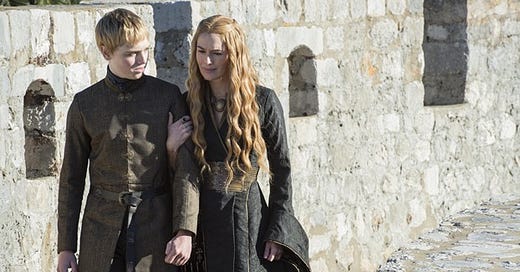S5, E1: Of Cersei and Certainty
In Sunday night’s season premiere, Game of Thrones opened with a flashback — a young Cersei Lannister and her along-for-the-ride friend…
In Sunday night’s season premiere, Game of Thrones opened with a flashback — a young Cersei Lannister and her along-for-the-ride friend visit a fortune teller named Maggy the Frog. Even before she was killing bottles of Dornish Red faster than Stark parents, young Cersei was no less insistent on getting her way — she quickly dismisses Maggy’s warning about the risks of knowing the future, insisting to hear her fate.
Cersei is told that she will never marry the prince, and thus would never be princess, but that she would be queen. However, Maggy also fortells that she will eventually be replaced by a younger, more beautiful queen. When Cersei asks about her future offspring, Maggy reveals that the king will have 20 children but that she will only have three, all of whom will die — “gold will be their hair and gold their shrouds.”
Four seasons deep into Game of Thrones, we’ve seen some of these prophecies come to fruition — King Robert had numerous bastard children and Cersei gave birth to three blond-haired offspring. However, Cersei is still queen and while Joffrey’s throat is now permanently dry, her other two children (Tommen and Myrcella) are alive and well. The prophecy certainly foreshadows certain events — Cersei’s animosity for Margery implies she views her as the “younger, more beautiful queen,” though in actuality Daenerys seems the more likely candidate.
Even more interesting than whether the rest of Maggy’s prophecies will come to fruition is another question: Would any of this have happened if Cersei hadn’t heard the prophecy? Through the lens of the prophecy, Cersei’s animosity towards King Robert seems more understandable — she knew Robert had fathered children out of wedlock and perhaps assumed that he would replace her with the “younger, more beautiful queen.” Perhaps she isn’t quite as nurturing of Joffrey’s awfulness if she isn’t paranoid that he may die at any minute. What we’re ultimately left with is the possibility of a self-fulfilling prophecy — we have no idea if these things would have happened if Cersei hadn’t gone to Maggy, we just know that they did.
For a show whose defining characteristic has been brutal consequences, the injection of prophecy adds an interesting wrinkle. Until now the presumption was that characters were, for better or worse, acting out of free will. If suddenly the free will of characters is in doubt, the brutal consequences seem almost cruel. Unlike Lost, another show known for flashbacks and embracing the free will vs determinism debate, Game of Thrones isn’t likely headed for a warm and fuzzy ending.
Consequently, Cersei’s fate is suddenly one of the most interesting plots going forward on Game of Thrones. With Joffrey and Tywin dead, Tyrion across the Narrow Sea, and Tommen still an innocent boy, Cersei theoretically has a tighter hold on the Iron Throne than ever before. Was Cersei’s future determined by a prophecy back when she was in Lannister middle school, or can she out-manipulate (or out-drink) her foretold fate?
Originally published at raleighco.com on April 15, 2015.




